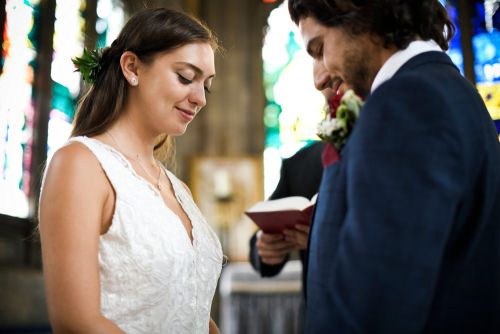 According to recent statistics, roughly 2.4 million weddings occur each year in the United States alone. Whether a couple decides to tie the knot in a religious venue, a converted barn, or on the beach, it can be important to think about who will be performing the ceremony. The officiant plays the most vital role of all: marrying the two people throwing the event. It goes without saying that this individual needs a license to perform marriages.
According to recent statistics, roughly 2.4 million weddings occur each year in the United States alone. Whether a couple decides to tie the knot in a religious venue, a converted barn, or on the beach, it can be important to think about who will be performing the ceremony. The officiant plays the most vital role of all: marrying the two people throwing the event. It goes without saying that this individual needs a license to perform marriages.
If you’re planning a wedding or have been asked to officiate one, you might have a few questions. Learn the basics by reviewing this guide to performing a marriage.
The Role of the Officiant
It is important to define the role of the officiant. Essentially, this is a person tasked with the responsibility of making a marriage official. This individual must understand the laws surrounding weddings and ensure that everyone present follows the correct steps for the union to be binding. Throughout history, priests and other representatives of religious orders have been the ones in charge of handling these ceremonies. This has led to the misconception that only religious figures can officiate weddings.
In truth, all you need is a license to perform a wedding. Whether or not you’re a member of a religious group, you can take the steps required to obtain a license. This means that you can pursue a license regardless of your gender, race, orientation, or any other factors. However, age does play into the equation. In some states, the officiant needs to be at least 18 years of age to go through the application process of becoming a minister. Still, there are places that will make an exception.
Check Individual State Laws
One key piece of advice to keep in mind when trying to get your license to perform weddings is that you will be the person responsible for understanding the local laws and how they impact marriage. While you may assume that marriage is handled on a federal level, this is far from the case. In fact, each of the 50 states has specific rules surrounding weddings and what steps a couple must take to get their marriage licenses. For example, age requirements are enforced in most states, with both parties needing to be at least 18 unless given explicit consent.
Though there are many matters handled on the state level, there are also federal decisions that impact all states. After same-sex marriage was legalized, it became recognized on a federal level. This means that state employees are not allowed to deny a marriage license to couples based on their sexual identities. Before you agree to marry anyone, you must first look over the laws in the state where the wedding will take place and feel confident that you understand what is expected of you.
The Process
If you need to get a license to marry someone, there are a few ways to go about it. Typically, you can go through a quick and easy online program and become a registered officiant within minutes. However, you might need to take extra steps to obtain a physical copy of your license and identification materials. Should your state require a copy of these papers, make sure you have them long before the date of the wedding. Beyond this, the process to get certified to marry someone is very straightforward.
When it comes to the role of the officiant, there are plenty of important points to remember. If you’ve been tasked with performing a wedding, now is the perfect time to learn more about the process and figure out how you can get your license to perform marriages.